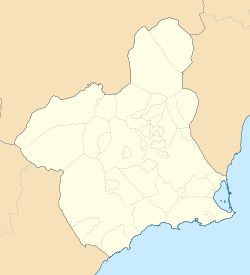Yecla | |
|---|---|
 Town hall | |
 Location in Murcia | |
| Coordinates: 38°36′36.0″N 1°6′52.1″W / 38.610000°N 1.114472°W | |
| Country | |
| A. community | |
| Province | |
| Comarca | Altiplano murciano |
| Judicial district | Yecla |
| Government | |
| • Mayor | María Remedios Lajara Domínguez (2021) |
| Area | |
• Total | 607.7 km2 (234.6 sq mi) |
| Elevation | 602 m (1,975 ft) |
| Population (2018)[1] | |
• Total | 34,234 |
| • Density | 56/km2 (150/sq mi) |
| Demonym | Yeclanos |
| Website | Official website |
Yecla (Spanish pronunciation: [ˈɟʝe.kla]) is a town and municipality in eastern Spain with 35243 people registered, in the extreme north of the autonomous community of Murcia, located 96 km from the capital of the region, Murcia.
Toponymy
[edit]The origin of the term Yecla comes from the Arabic Yakka, which was the name of a fortress located in the place that is now called Cerro del Castillo. This toponym, however, is not from Arabic origin and it is very likely that it derives from the pre-Roman terms Iko or Ika.
The most important mountains of the locality are Sierra de Salinas (1,238 m), Monte Arabí (1,065 m), Sierra de la Magdalena (1,038 m), and others. The chief buildings are a half-ruined citadel, a modern parish church with a pillared Corinthian facade, and a town hall standing in a fine arcaded plaza mayor (square). Yecla has traditionally had a thriving trade in grain, wine, oil, fruit and other agricultural products produced in the surrounding country. Since the second half of the 20th century, furniture making has become a local trade.
Monuments
[edit]- Mayor Square: monumental gathering renascentist and baroque on the heart of historical center. In the square, followed by ayuntamiento building 16th century, there are also located the Alarcos Palace, the Lonja and the clock tower.
- Concha Segura Theatre: In 1890 the architect Justo Millán Espinosa, improved the theatre front and, in 1899, the theatre, received the name of “Concha Segura” as tribute.
- Castle: Remains of fortified square of the old andalusí population of HisnYakka (11th century).
- Old Church: Is a civil monument, not religious as there haven’t been any events from 1936, the year when it was ransacked and burned in revolts that took place after the revolutionary rise on 16 March of that same year. Until that year it had been called Reitoria do Salvador, before Our Lady of Cathedral of the Immaculate: best known as the “New Church” which is the main temple of the city, built between 1775 and 1868 with neoclassic style. The building base is cross shaped.
- Castle Sanctuary: a temple built in the 19th century by a hermit.
Economy
[edit]Yecla, with neighboring Jumilla, is one of the primary regions for development of the Murciana and Granadina breeds of dairy goats.[2]
Since the mid-19th century Yecla was consolidated as an agricultural municipality, in particular with the wine production. The main cultures in the region are vines, olive trees, almonds and cereals. In the mid-19th century a new sector rose with the expansion of Yecla. The wood craftsmen have fostered the furniture industry and today Yecla is known by its great furniture production.
Yecla is also a wine-producing region, another attribute it shares with close-by Jumilla[3]
Politics: Town Councilors
[edit]Municipal elections results in 2023 PP 9 PSOE 7 VOX 3 IU
Twin towns
[edit] Vinaròs, Spain
Vinaròs, Spain Eibar, Spain
Eibar, Spain El Barco de Ávila, Spain
El Barco de Ávila, Spain
Notable people
[edit]- Eva Navarro (born 2001), footballer for the Spain national team
See also
[edit]References
[edit]- ^ Municipal Register of Spain 2018. National Statistics Institute.
- ^ European Association for Animal Production (1978), "Ruminant production in the dry subtropics: constraints and potentials", EAAP Publication (38), Butterworths: 68, ISBN 978-90-220-0949-9
- ^ Wine culture
External links
[edit]- Yecla Community web site for expats
- Yecla.org
- The wine region DO Yecla
- Las cazoletas y petroglifos de Yecla, Murcia (Open Library)



